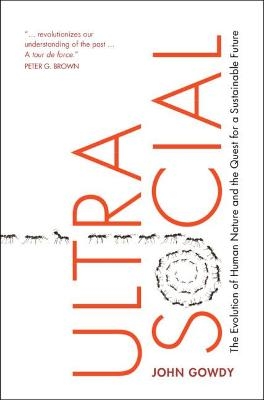
Ultrasocial
Cambridge University Press (Verlag)
978-1-108-83826-9 (ISBN)
Ultrasocial argues that rather than environmental destruction and extreme inequality being due to human nature, they are the result of the adoption of agriculture by our ancestors. Human economy has become an ultrasocial superorganism (similar to an ant or termite colony), with the requirements of superorganism taking precedence over the individuals within it. Human society is now an autonomous, highly integrated network of technologies, institutions, and belief systems dedicated to the expansion of economic production. Recognizing this allows a radically new interpretation of free market and neoliberal ideology which - far from advocating personal freedom - leads to sacrificing the well-being of individuals for the benefit of the global market. Ultrasocial is a fascinating exploration of what this means for the future direction of the humanity: can we forge a better, more egalitarian, and sustainable future by changing this socio-economic - and ultimately destructive - path? Gowdy explores how this might be achieved.
John Gowdy is Emeritus Professor of Economics, Rensselaer Polytechnic Institute, where he served as Chair of the Department of Economics and as Graduate Director of the Ecological Economics program. He was previously a Leverhulme Professor at Leeds University and a Fulbright Professor at the Economic University of Vienna.
Part I. The Evolution of Human Ultrasociality: 1. The Ultrasocial Origin of our Existential Crisis; 2. The Evolution of Ultrasociality in Humans and Social Insects; 3. Our Hunter-Gatherer Heritage and the Evolution of Human Nature; 4. The Agricultural Transition and how it Changed our Species; Part II. The Rise and Consolidation of State/Market Societies: 5. The Rise of State Societies; 6. The Modern State/Market Superorganism; 7. Neoliberalism: The Ideology of the Superorganism; Part III. Back to the Future: 8. Taming the Market: A Minimal Bioeconomic Program; 9. Evolving a Sustainable and Equitable Future: What can we learn from Non-Market Cultures?; 10. Reclaiming Human Nature: The Future will be Better (Eventually); Index.
| Erscheinungsdatum | 26.08.2021 |
|---|---|
| Zusatzinfo | Worked examples or Exercises |
| Verlagsort | Cambridge |
| Sprache | englisch |
| Maße | 160 x 235 mm |
| Gewicht | 560 g |
| Themenwelt | Naturwissenschaften ► Biologie ► Ökologie / Naturschutz |
| Recht / Steuern ► EU / Internationales Recht | |
| Sozialwissenschaften ► Ethnologie | |
| Sozialwissenschaften ► Soziologie | |
| Wirtschaft ► Volkswirtschaftslehre | |
| ISBN-10 | 1-108-83826-X / 110883826X |
| ISBN-13 | 978-1-108-83826-9 / 9781108838269 |
| Zustand | Neuware |
| Informationen gemäß Produktsicherheitsverordnung (GPSR) | |
| Haben Sie eine Frage zum Produkt? |
aus dem Bereich


